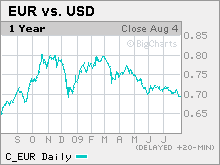Dollar gains ahead of jobs report
The greenback climbs versus the euro ahead of employment report. The pound plunges 1% as BoE says it will pump more cash into banking system.
NEW YORK (Reuters) -- Sterling plunged Thursday after Britain's central bank said it would pump more money into a still fragile banking system while the dollar gained on the euro ahead of a much anticipated U.S. employment report.
The Bank of England did not change interest rates but surprised markets by raising the size of a bond purchasing program designed to boost lending. That would require it to print more money, leading to an oversupply of sterling.
The pound fell more than 1% against the dollar, retreating from a 10-month peak above $1.70. It also fell against the euro after the European Central Bank left interest rates at 1% and predicted a gradual recovery in 2010.
Analysts said the BoE's move suggested the UK economy is still struggling, sentiment that injected caution into a market eager to buy higher-risk currencies and assets.
"The BoE move was a surprise and is a double-edged sword. It's reassuring that they are prepared to do what's needed but also hints that the global recovery may not be as aggressive as markets had thought," said Mike Moran, senior FX strategist at Standard Chartered in New York.
Thursday's bout of risk aversion hit Wall Street stocks, and lifted the dollar off multi-month lows against the euro and other currencies as investors sought a safe haven.
Investors also hedged positions ahead of Friday's nonfarm payrolls data, which is expected to show the pace of U.S. job losses slowed in July.
The euro fell 0.4% to $1.4348, retreating from a nine-month high of $1.4446 earlier this week. Sterling fell 1.2% to $1.6778. The euro rose 0.6% against sterling to 85.52 pence. Against the yen, the dollar rose 0.6% to ¥95.42.
Standard Chartered's Moran said markets were ripe for a pullback as equities, commodities and several foreign currencies have pushed into overbought territory in recent sessions.
To reignite the rally, investors will want to see that the U.S. labor market is following the manufacturing and housing sectors, which have both flashed some encouraging signals that the worst of the recession may be over, he said.
Economists polled by Reuters expect data to show employers cut 320,000 jobs in July, down from a loss of 467,000 jobs the prior month.
If that forecast proves accurate, analysts said, the dollar would likely fall as investors redirect money into stocks, commodities and currencies that promise higher returns.
Data on Thursday showing that the number of Americans filing for first-time jobless benefits fell in the week to Aug. 1 whetted appetites for more good news on the job front.
But there's still reason to be cautious, meaning that currency investors may want to be wary of prematurely extending bets against the dollar, analysts said.
"The harsh reality is that companies are not going to start hiring any time soon. Consumers won't be able to bring this country out of recession via spending," said Jessica Hoversen, fixed-income and currency analyst at MF Global in Chicago. "And in Europe, some of its largest economies are still very fragile." ![]()


